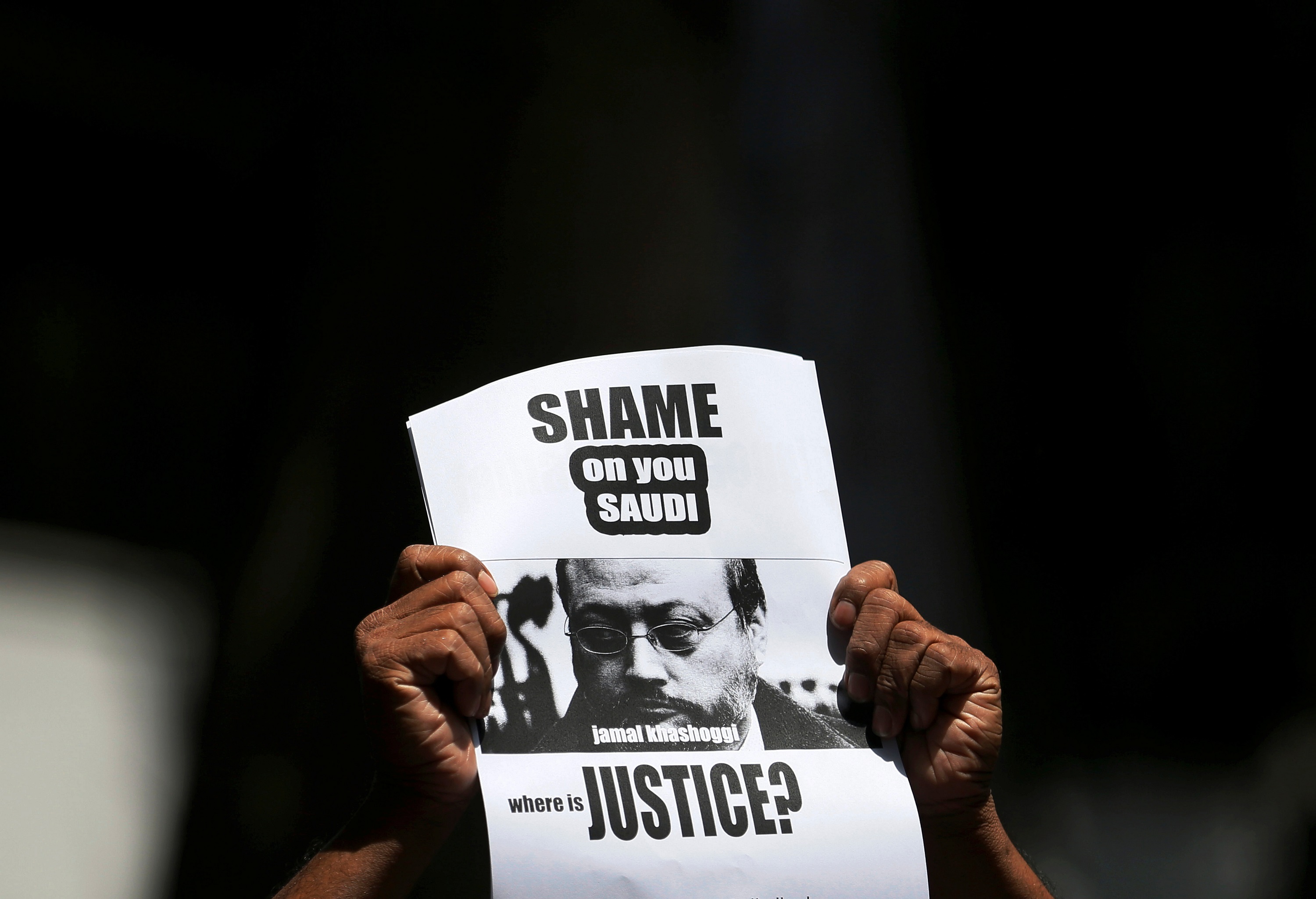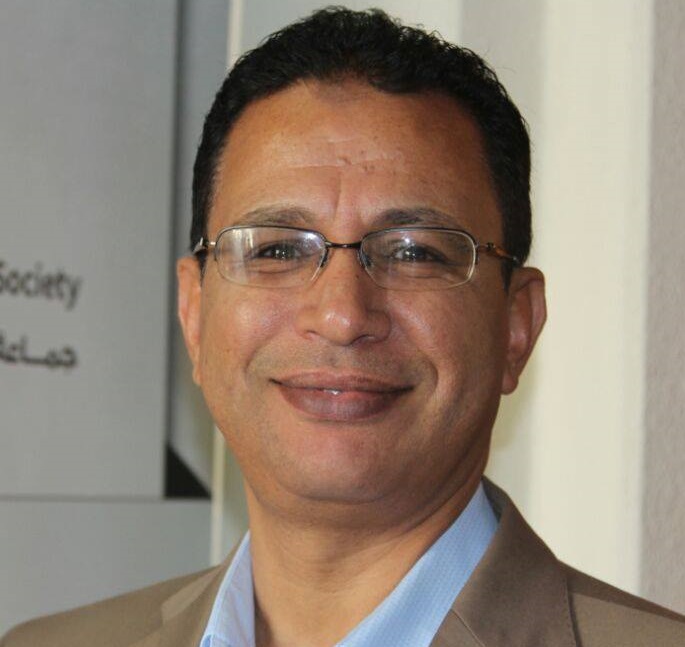"الحقيقة لا تموت أبداً، وكذلك يجب ألا ينطفئ وهج التزامنا بالحق الأساسي في حرية التعبير". غطت هذه العبارة مساحة كبيرة من صفحة الأمم المتحدة على الإنترنت في اليوم العالمي لإنهاء الإفلات من العقاب على الجرائم المرتكبة بحق الصحفيين، الذي يوافق الثاني من نوفمبر/تشرين الثاني من كل عام. وبينما كانت الوسائل الإعلامية والحقوقية الدولية تحصي الأعداد المتزايدة من الصحفيين الذين وقعوا ضحايا أعمال قتل واغتيال ممنهج، وعددهم 77 صحفياً خلال العام 2018 فقط، كان حادث اغتيال الصحفي السعودي جمال خاشقجي داخل قنصلية بلاده مطلع أكتوبر/تشرين الأول الماضي ما زال يفرض نفسه على أجندة الاهتمامات الدولية، ليمثل حدثاً فاصلاً ونقطة تحول مهمة، ويعزز المطالبة الدولية المستمرة بوضع حد للخطورة التي يواجهها الصحفيون في العالم، بناء على التأثيرات التي تركتها قصة الصحفي الذي أتى قنصلية بلاده طالباً العون، ولم يخرج منها.
انتصار تاريخي للنزاهة
يمكن القول إن تداعيات هذا الحدث ونتائجه قد تجعل عالم ما بعد خاشقجي مختلفاً عما سبقه، وإن تاريخ الثاني من أكتوبر 2018 الذي وقعت فيه هذه الجريمة المروعة قد يبقى محفوراً في ذاكرة البشرية لسنوات طويلة. إن وسائل الإعلام في مختلف دول العالم تقريباً قد انتصرت في معركة النزاهة، واختارت جميعها وباستثناءات قليلة -ربما في سابقة تاريخية- أن تقدم المبادئ على المصالح الضيقة، وأن تنتصر للحقيقة التي ما كان لها أن تظهر لولا وجود صحافة حرة غير مرتبطة بتمويل من الطرف الفاعل والأطراف المتحالفة معه.
ولهذا الاستثناء التاريخي عوامله المتصلة بطبيعة القصة نفسها، حيث كتبت مجلة "تايم" الشهيرة التي اختارت خاشقجي، ومعه إعلاميين آخرين، شخصية العام 2018: "كل تفصيل في حياة خاشقجي كان مثيراً للاهتمام حتى في ما يتصل بمقتله.. التوقيتات الزمنية لنقل كاميرات فيديو المراقبة لحظة دخوله القنصلية، وصور ممشى المطار الذي أظهر قاتليه، ومنشار العظام وصوت كلماته الأخيرة التي تخنق الحياة منه مردداً: لا أستطيع التنفس. إن جميع تلك التفاصيل لم تكن لتظل على قمة أجندة الأخبار لمدة شهرين لولا الحالة الملحمية لشخصية خاشقجي والغياب الكامل للأخلاق في سياسة قاتله".
مؤشرات أولية يمكنها أن تقودنا إلى تعمق القلق العالمي إزاء قضية خاشقجي منذ الساعات الأولى التي تلت الاغتيال، بينها تصدر وسم جمال خاشقجي على موقع "تويتر" لمدة تزيد عن أسبوع في بعض الدول. هذا الوسم الذي أبقت وسائل الإعلام جذوته مشتعلة، إذ تسابقت في متابعة الجريمة والإعلان عن الكثير من التفاصيل المروعة والتصريحات التي صاحبت عملية الاغتيال. على محرك البحث غوغل، أظهر البحث عن الأحداث المتصلة بالقضية ما يزيد عن 5000 نتيجة خلال أسبوع واحد. ورغم أنه من المبكر الوصول إلى استنتاجات عامة تستند إلى دراسة تحليلية موسعة لحجم ونوعية التغطية التي قدمتها وسائل الإعلام، فإنه يمكننا الزعم وبدرجة ثقة كبيرة أن الإعلام الدولي -باستثناء الإعلام السعودي وتوابعه وحلفائه في الإمارات والبحرين ومصر- هو من أجبر السلطات السعودية على تغيير روايتها للحادث، ودفعها إلى الانتقال التدريجي من الإنكار التام إلى الاعتراف الكامل بالجريمة والقبض على المشتبه بارتكابهم لها.
الفاعلون الجدد
بين أغسطس/آب 1990 وفبراير/شباط 1991، كان مراسل قناة "سي.أن.أن" الأميركية بيتر آرنيت رفقة زملائه من المراسلين، ينقلون عبر بث فضائي مباشر من فندق في بغداد، تفاصيل ووقائع الحرب المتلفزة والمسماة عملية "عاصفة الصحراء" الموجهة لتدمير القوات العراقية التي احتلت الكويت. سمحت تكنولوجيا الاتصال حينها لأول مرة بأن يشاهد العالم حرباً تلفزيونية، ويرى صوراً حية لحاملات الطائرات ومسارات الصواريخ، والسماء التي كانت تضيء كل مرة بفعل وصول القنابل العنقودية إلى أهدافها. وبسبب سخونة الحدث، وطرد غالبية المراسلين الأجانب من بغداد، كانت تغطية "سي.أن.أن" على الهواء مباشرة ودون مونتاج منعطفاً حاسماً في التغطية الإخبارية المتواصلة.
إن تأثير شبكة الجزيرة وصحيفة "واشنطن بوست" في مسار قضية خاشقجي يذكرنا بتأثير شبكة "سي.أن.أن" الأميركية في حرب تحرير الكويت مطلع تسعينيات القرن الماضي. لقد أثبتت الجزيرة وواشنطن بوست في حادث خاشقجي قدرة وسائل الإعلام التقليدية، كما الجديدة، إذا ما توفرت لديها الإرادة والدافعية والإمكانات المادية والبشرية على أن تكون ذات تأثير بالغ في السياسات والأحداث والقضايا العالمية، وقدرتها غير المحدودة في مواجهة من يريدون إخفاء الحقيقة أو التلاعب بها.
ولعل من أهم عوامل نجاح وسائل الإعلام في كشف حقيقة الجريمة دخول مؤسسات إعلامية قوية وذات تاريخ في سباق وصراع حقيقي من أجل وضع الحادث على رأس أجندة اهتمامات العالم، وإبقائه على هذه الأجندة لأطول فترة ممكنة. صحيح أن كل وسيلة من هذه الوسائل دخلت معركة الحقيقة مدفوعة ربما بمصالحها الخاصة، بينها تصفية حسابات مع الرئيس الأميركي دونالد ترامب وحزبه الجمهوري الذي قدم المصالح الاقتصادية مع السعودية على المبادئ، ولكن المحصلة النهائية تؤكد أن جميع هذه الوسائل -ودون اتفاق مسبق ظاهر على الأقل- قد التزمت منذ بداية القضية وحتى الآن نفس خط رواية الإدانة التي اعتمدت على تسريبات السلطات في أنقرة، سواء لوكالة رويترز البريطانية أو وكالة الأناضول التركية شبه الرسمية، أو الصحف التركية.
وفي هذا الإطار، لا يمكن تجاهل الدور المحوري الذي لعبته قناة الجزيرة على المستويين العربي والعالمي في المتابعة المستمرة للقضية، وقيادة وسائل الإعلام العربية والعالمية غير المرتبطة بالتحالف السعودي، عبر تغطية خبرية موسعة وعلى مدار الساعة، استعادت من خلالها قطاعاً كبيراً من مشاهديها وذكرتهم بتغطيتها المتفردة والمتواصلة لأحداث الربيع العربي قبل سنوات. كما لا يمكن أيضا إنكار الدور الرئيسي الذي قامت به صحيفة "واشنطن بوست" التي كان يكتب فيها خاشقجي، وصحيفة "نيويورك تايمز"، في قيادة الصحف ووسائل الإعلام الأميركية والعالمية لتشكيل ما يشبه التحالف الإعلامي الدولي المناهض للرواية السعودية، الذي ما زال يمارس ضغوطاً شديدة على صناع القرار في واشنطن والدول الغربية، خاصة عبر مقالات الرأي وتقارير المراسلين من موقع الحدث والعواصم الدولية المرتبطة به.
في هذا السياق، عبّرت كارين عطية مسؤولة صفحات الرأي في "واشنطن بوست" والزميلة السابقة لخاشقجي قائلة: "لا يمكنني الابتعاد أو تجاهل ما حدث فقط لكونه مجرد سياسة وأن هذا هو الشرق الأوسط.. لا أريد أن أكون بهذه الضحالة وأسمح بأن تحدث هذه الجرائم باستمرار.. إن مهمة المحرر هي الإبقاء على أصوات كتّابه وصحفييه".
تحالف إعلامي للدفاع عن الحقيقة
يدفعنا تأثير الإعلام في قضية خاشقجي إلى الحديث عن إمكانية إقامة تحالف إعلامي دولي للدفاع عن الحقيقة في كل أنحاء العالم، يضم الصحف والمحطات التلفزيونية التي شاركت في التغطية المتميزة لجريمة القنصلية. ويمكن أن يتطور هذا التحالف ليصبح أساساً لنظام إعلامي عالمي جديد تكون المبادرة فيه لوسائل الإعلام لا لحكومات الدول المختلفة، كما كان الحال في النظام العالمي الإعلامي الذي ثار الجدل حوله في منظمة اليونسكو خلال سبعينيات وثمانينيات القرن الماضي وفشلت المنظمة الدولية في إقراره.
إن الساحة الإعلامية العالمية أصبحت مهيأة الآن وأكثر من أي وقت مضى لقيام مثل هذا التحالف الإعلامي، خاصة أن حادث اغتيال خاشقجي أثبت أن هناك وسائل إعلام عديدة في العالم وصحفيين كثيرين ينحازون إلى الحقيقة ولا يخضعون للابتزاز المادي والمعنوي لتغيير قناعاتهم وإبعادهم عن نصرة الحقيقة.
لقد مضى الزمن الذي كنا نتحدث فيه عن تمييز واضح بين وسائل الإعلام في الدول المتقدمة ومثيلاتها في دول العالم الثالث، بعدما أذابت تكنولوجيا الاتصال والمعلومات الجليد الذي كان يحول دون التواصل المثمر بين هذه الوسائل، خاصة في الدفاع عن الحقيقة ومواجهة انتهاكات حقوق الإنسان ودعم حرية الرأي والتعبير. وفي مرحلة ما بعد خاشقجي، أصبحت الفرصة مواتية لإطلاق مبادرات إعلامية عالمية جديدة، تتضامن من خلالها وسائل الإعلام الرائدة في العالم مثل الجزيرة، والسي.أن.أن، والواشنطن بوست، ونيويورك تايمز، والغارديان، والإندبندنت، والإيكونوميست وغيرها، وتشكل تحالفاً إعلامياً عالمياً يستهدف نشر الحقائق أيا كان الثمن، والوفاء بحق الجمهور في الحصول على معلومات صحيحة.
يقظة إعلامية
"كان الناس في العالم العربي مفتونين بالحرية ومنغمسين في توقعات مجتمع مشرق حرّ، لكن سرعان ما تحطمت هذه التوقعات".. بهذه الكلمات عبّر جمال خاشقجي في آخر مقالة نشرها بصحيفة واشنطن بوست عن حالة تلاشي الحريات التي يعيشها الإنسان العربي تحت وطأة الرقابة والسلطوية.
إن أفضل تكريم وتخليد لذكرى شهيد الصحافة جمال خاشقجي الذي قدم حياته ثمنا لحرية الرأي، أن يكون موته باعثاً على يقظة إعلامية عالمية، تعيد للإعلام اعتباره وتحفظ حياة الإعلاميين من غدر السياسيين الذي لم ولن يتوقف.








































